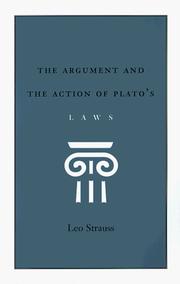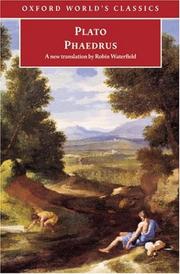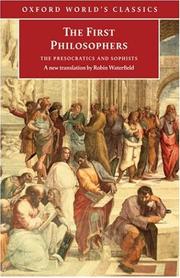| Listing 1 - 9 of 9 |
Sort by
|
Book
Year: 1886 Publisher: Paris : Bibliothèque nationale,
Abstract | Keywords | Export | Availability | Bookmark
 Loading...
Loading...Choose an application
- Reference Manager
- EndNote
- RefWorks (Direct export to RefWorks)

ISBN: 0226776980 9780226776989 Year: 1975 Publisher: Chicago ; London : University of Chicago Press,
Abstract | Keywords | Export | Availability | Bookmark
 Loading...
Loading...Choose an application
- Reference Manager
- EndNote
- RefWorks (Direct export to RefWorks)
Filosofia antiga. --- Filosofia grega. --- Plato. --- Plato, --- Platōn. --- Laws (Plato).

ISBN: 0191875368 1280374896 0191589535 0585486123 9780585486123 9780191589539 0192802771 9780192802774 9786610374892 6610374899 0199554021 9780199554027 Year: 2002 Publisher: Oxford New York
Abstract | Keywords | Export | Availability | Bookmark
 Loading...
Loading...Choose an application
- Reference Manager
- EndNote
- RefWorks (Direct export to RefWorks)
Phaedrus is widely recognized as one of Plato's most profound and beautiful works. It takes the form of a dialogue between Socrates and Phaedrus and its ostensible subject is love, especially homoerotic love. This new translation is accompanied by an introduction and full notes that discuss the structure of the dialogue and elucidate issues that might puzzle the modern reader.
Love --- Rhetoric --- Filosofia antiga. --- Filosofia grega. --- Kommentar. --- Love. --- Retórica latina. --- Rhetoric. --- Plato, --- Phaedrus, --- PlatÃo, --- SÓcrates,
Book
Year: 1967 Publisher: Dublin ; Zürich : Weidmann,
Abstract | Keywords | Export | Availability | Bookmark
 Loading...
Loading...Choose an application
- Reference Manager
- EndNote
- RefWorks (Direct export to RefWorks)
Philosophy, Ancient. --- Knowledge, Theory of. --- Ethics --- Filosofia grega. --- Democritus. --- Protagoras, --- Protagoras.

ISBN: 1280680105 9786613657039 0191592471 9780191592478 0192824546 9780192824547 019953909X 9780199539093 0191605069 Year: 2000 Publisher: Oxford Oxford university press
Abstract | Keywords | Export | Availability | Bookmark
 Loading...
Loading...Choose an application
- Reference Manager
- EndNote
- RefWorks (Direct export to RefWorks)
These first philosophers paved the way for the work of Plato and Aristotle - and hence for the whole of Western thought. This is a unique and invaluable collection of the works of the Presocratics and the Sophists. Waterfield brings together the works of these early thinkers with brilliant new translation and exceptional commentary. This is the ideal anthology for the student of this increasingly appreciated field of classical philosophy. - ;The first philosophers paved the way for the work of Plato and Aristotle - and hence for the whole of Western thought. Aristotle said that philosophy begi
Pre-Socratic philosophers. --- Sophists (Greek philosophy) --- Philosophy, Ancient --- Pre-Socratics --- Presocratic philosophers --- Presocratics --- Philosophers --- Filosofia antiga. --- Filosofia grega. --- Försokratiker. --- Pré-socráticos. --- Présocratiques. --- Quelle. --- Sofistas. --- Sofisterna. --- Sophistes grecs. --- Sophistik --- Sophistik. --- Sophists (Greek philosophy). --- Vorsokratiker --- Vorsokratiker. --- Pre-Socratic philosophers --- History of philosophy

ISBN: 0691001782 0691001774 9780691001777 9780691001784 Year: 1999 Publisher: Princeton, N.J. Princeton University Press
Abstract | Keywords | Export | Availability | Bookmark
 Loading...
Loading...Choose an application
- Reference Manager
- EndNote
- RefWorks (Direct export to RefWorks)
"The eminent philosopher and classical scholar Alexander Nehamas presents here a collection of his most important essays on Plato and Socrates. The papers are unified in theme by the idea that Plato's central philosophical concern in metaphysics, ethics, and aesthetics was to distinguish the authentic from the fake, the original from its imitations. In approach, the collection displays Nehamas's characteristic combination of analytical rigor and sensitivity to the literary form and dramatic effect of Plato's work. Together, the papers represent Nehamas's distinct and original contributions to scholarship on Plato and Socrates and serve as a comprehensive introduction to the thought of these two philosophers." "In the book's opening section, Nehamas discusses Plato's representation of Socrates as a model of authentic human goodness, showing that Plato's Socrates is a more skeptical, troubling, and individualistic thinker than is usually supposed. The papers in the second section form a sustained defense of a new and important understanding of Plato's theory of the forms and the evolution of that theory in Plato's later writings. The third section examines Plato's contention that popular entertainment--by which he meant Greek epic and tragic poetry--misleads its audience into a debased life, an argument Nehamas relates to modern anxieties about television and other forms of popular culture. The collection also includes a discussion of Plato's use of the dialogue form in his representation of Socrates and carefully examines the combination of literary and philosophical elements in his work." "Nehamas argues in the book that Plato's specific judgments of what is authentic are often flawed, but that his idea of authenticity as the mark of truth, beauty, and goodness is stronger than many modern scholars have assumed. In drawing together Nehamas's many influential ideas about Plato and Socrates, Virtues of Authenticity is a major contribution to the study of ancient Greek philosophy. Book jacket."--Jacket.
History of philosophy --- Plato --- Socrates --- Authenticity (Philosophy) --- Philosophy, Ancient --- Authenticité (Philosophie) --- Philosophie ancienne --- History --- Histoire --- Plato. --- Socrates. --- Authenticité (Philosophie) --- Socrate --- Socrates Constantinopolitanus Scholasticus --- Aflāṭūn --- Aplaton --- Bolatu --- Platon, --- Platonas --- Platone --- Po-la-tʻu --- Pʻŭllatʻo --- Pʻŭllatʻon --- Pʻuratʻon --- Πλάτων --- אפלטון --- פלאטא --- פלאטאן --- פלאטו --- أفلاطون --- 柏拉圖 --- 플라톤 --- Platon --- Platoon --- Authenticiteit. --- Deugden. --- FILOSOFIA ANTIGA --- FILOSOFIA GREGA. --- PLATONISMO. --- Plato, --- Platon. --- Socrate. --- Socrates, --- Flaemmings, Friederich. --- Платон --- プラトン --- Sokrates

ISBN: 0199252890 9780199252893 019929769X 9780199297696 0191601403 9786611989934 1281989932 0191531006 Year: 2004 Publisher: Oxford Clarendon
Abstract | Keywords | Export | Availability | Bookmark
 Loading...
Loading...Choose an application
- Reference Manager
- EndNote
- RefWorks (Direct export to RefWorks)
(Publisher-supplied data) The ancient philosophical school of Epicureanism tried to argue that death is "nothing to us." Were they right? James Warren provides a comprehensive study and articulation of the interlocking arguments against the fear of death found not only in the writings of Epicurus himself, but also in Lucretius' poem De rerum natura and in Philodemus' work De morte. These arguments are central to the Epicurean project of providing ataraxia (freedom from anxiety) and therefore central to an understanding of Epicureanism as a whole. They also offer significant resources for modern discussions of the value of death--one which stands at the intersection of metaphysics and ethics.
Death. --- Epicureans (Greek philosophy) --- Epicurus. --- Epicurean philosphers --- Epicureanism --- Epicureeërs (Griekse filosofie) --- Epicuriens (Philosophie grecque) --- Epicurisme --- Epikureismus --- Philosophes épicuriens --- Philosophie épicurienne --- École épicurienne --- Épicurisme --- Épicurisme (Philosophie grecque) --- Épicuréisme --- Mort --- Epicuriens --- Death --- Philosophy, Ancient --- Dying --- End of life --- Life --- Terminal care --- Terminally ill --- Thanatology --- Philosophy --- Epicurus --- Ἐπίκουρος --- Epikouros --- Epikuros --- Ėpikur --- Epiḳoros --- Epicuro --- Abīqūr --- Yibijiulu --- Epicure --- Epʻikʻurosŭ --- Attitude to Death. --- Philosophy. --- Epicureans (Greek philosophy). --- Doodsangst. --- Epicurisme. --- Klassieke oudheid. --- Mort. --- Épicuriens. --- Tod. --- Philosophie. --- Epikureer. --- Epicurismo. --- Filosofia grega. --- Épicure. --- Epicuro.

ISBN: 0674007131 0674576136 9780674007130 9780674576131 Year: 1998 Publisher: Cambridge (Mass.): Harvard university press
Abstract | Keywords | Export | Availability | Bookmark
 Loading...
Loading...Choose an application
- Reference Manager
- EndNote
- RefWorks (Direct export to RefWorks)
"This volume collects some of John McDowell's influential papers, written at various times over the last two decades. One group of essays deals mainly with issues in the interpretation of the ethical writings of Aristotle and Plato. A second group of papers contains more direct treatments of questions in moral philosophy that arise naturally out of reflection on the Greek tradition. Some of the essays in the second group exploit Wittgensteinian ideas about reason in action, and they open into the third group of papers, which contains readings of central elements in Wittgenstein's difficult later work. A fourth group deals with issues in the philosophy of mind and with questions about personal identity and the special character of first-personal thought and speech."--Jacket.
Philosophical anthropology --- Philosophy --- Wittgenstein, Ludwig, --- Philosophy of mind --- Values --- Reality --- Philosophie de l'esprit --- Valeurs (Philosophie) --- Réalité --- Filosofische antropologie --- Mental philosophy --- Humanities --- Wei-tʻe-ken-ssu-tʻan, --- Wei-tʻe-ken-ssu-tʻan, Lu-te-wei-hsi, --- Wittgenstein, L. --- Vitgenshteĭn, L., --- Wei-ken-ssu-tʻan, --- Pitʻŭgensyutʻain, --- Vitgenshteĭn, Li︠u︡dvig, --- Weitegenshitan, --- Wittgenstein, Ludovicus, --- Vitgenshtaĭn, Ludvig, --- ויטגנשטיין, לודוויג --- 维特根斯坦, --- Wittgenstein, Ludwig Josef Johann, --- Filosofia contemporânea. --- Filosofia grega (interpretação). --- Filosofie van de geest. --- Mente (filosofia). --- Philosophie. --- Philosophy. --- Ética. --- Wittgenstein, Ludwig, - 1889-1951
Book
ISBN: 303022161X 3030221601 Year: 2019 Publisher: Cham : Springer International Publishing : Imprint: Palgrave Macmillan,
Abstract | Keywords | Export | Availability | Bookmark
 Loading...
Loading...Choose an application
- Reference Manager
- EndNote
- RefWorks (Direct export to RefWorks)
This book argues that according to Metaphysics Zeta, substantial forms constitute substantial being in the sensible world, and individual composites make up the basic constituents that possess this kind of being. The study explains why Aristotle provides a reexamination of substance after the Categories, Physics, and De Anima, and highlights the contribution Z is meant to make to the science of being. Norman O. Dahl argues that Z.1-11 leaves both substantial forms and individual composites as candidates for basic constituents, with Z.12 being something that can be set aside. He explains that although the main focus of Z.13-16 is to argue against a Platonic view that takes universals to be basic constituents, some of its arguments commit Aristotle to individual composites as basic constituents, with Z.17’s taking substantial form to constitute substantial being is compatible with that commitment. .
Philosophy, classical. --- Greek philology. --- Classical Philosophy. --- Greek. --- Classical philology --- Greek language --- Greek literature --- Philosophy, Ancient. --- Greek language. --- Classical languages --- Indo-European languages --- Greek philology --- Ancient philosophy --- Greek philosophy --- Philosophy, Greek --- Philosophy, Roman --- Roman philosophy --- Metafísica --- Substància (Filosofia) --- Filosofia antiga --- Aristòtil, --- Filosofia clàssica --- Filosofia --- Ciència antiga --- Cosmologia antiga --- Eleàtics --- Epicureisme --- Estètica antiga --- Estoïcisme --- Filosofia grega --- Filosofia romana --- Gnosticisme --- Maniqueisme --- Megàrics --- Neoplatonisme --- Orfisme --- Filòsofs antics --- Realitat --- Quatre elements (Filosofia) --- Ésser (Filosofia) --- Ontologia --- Subjecte (Filosofia) --- Absolut (Filosofia) --- Causalitat --- Cosmologia --- Espai (Filosofia) --- Espai i temps --- Forma (Filosofia) --- Hilemorfisme --- Immanència (Filosofia) --- Infinit --- Necessitat (Filosofia) --- Raó suficient --- Repetició (Filosofia) --- Teoria del coneixement --- Temps (Filosofia) --- U (L'U en filosofia) --- Valors (Filosofia) --- Déu --- Filosofia de la ment --- Transcendència (Filosofia) --- Aristotelis, --- Aristoteleus, --- Aristoteloys, --- Aristotle, --- Aristote, --- Aristotele, --- Aristóteles, --- Arystoteles, --- Aristóteles --- Aristòtil --- Cosmovisió
| Listing 1 - 9 of 9 |
Sort by
|

 Search
Search Feedback
Feedback About UniCat
About UniCat  Help
Help News
News